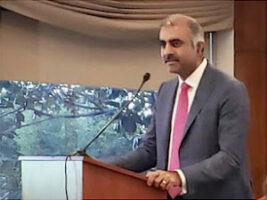Panel Discussion at IIT Delhi Leadership Conclave, 11th November 2017
The First Industrial Revolution used water and steam power to mechanize production. The Second used electric power to create mass production. The Third used electronics and information technology to automate production. Now a Fourth Industrial Revolution is building on the Third, the digital revolution that has been occurring since the middle of the last century. It is characterized by a fusion of technologies that is blurring the lines between the physical, digital, and biological spheres. These include artificial intelligence, robotics, the Internet of Things, autonomous vehicles, 3-D printing, nanotechnology, biotechnology, materials science, energy storage, and quantum computing. This technological revolution will fundamentally alter the way we live, work, and relate to one another. In its scale, scope, and complexity, the transformation will be unlike anything humankind has experienced before (excerpted from article by Klaus Schwab, World Economic Forum).
To understand the impact of the 4th Industrial Revolution on India and to create the required ecosystem, IIT Delhi alumni association organised a leadership conclave on 11th November 2017. I had the opportunity to lead a panel discussion on “Creating the framework for large, sustainable businesses”. We had stellar cast of business leaders for this discussion that included Puneet Dalmia (Dalmia Cements), Jai Menon (HT Media), Amarinder Dhaliwal (IndiaMart), Sumit Sarawgi (Boston Consulting Group) and Sunil Chaturvedi (ASDC).
Early on in our discussion we realized that building large and scalable businesses in the era of the 4th Industrial Revolution is a multidimensional problem that has to be solved at various levels – enterprises, industry, academia, society and finally the individual.
Sharing below is a synopsis of discussion we had in the panel:
A. How Enterprises need to evolve
Enterprises need to build new skills and competencies and evolve their culture. There are six changes that are critical:
- Customer Centric. Being customer centric is a timeless success mantra for businesses. However, the intensity of it has increased dramatically in this era of continuous technology disruption. Customers have so many choices, increasing price transparency, expectations of very high service levels, and many players who are already fulfilling these needs. Enterprises have to raise their game and make being customer centric not just a nice slogan but the reality of their business. Technology can be a great enabler helping enterprises understand, connect with and fulfil needs of customers in more real time and targeted ways.
- Agile. Product lifecycles are becoming shorter and enterprises have to raise their speed of response dramatically. Use of agile methodologies in technology development has been in vogue for a while. The agile mindset is not just about software development but has to be pervasive in all parts of the organisation – from strategy to product development to execution. For example, enterprises are responding by involving customers directly in their product development and by building flatter organisation structures to improve speed of execution.
- Technology DNA. In the era of the 4th Industrial Revolution, every business is becoming a technology driven business and every enterprise needs to build a technology DNA. Historically, technology has been an enabler perhaps even a support function in most businesses. Technology is now becoming the core whether you are in a rapidly transforming industry like media or more traditional industries like infrastructure. Enterprises need to build new set of skills, in particular the ability to connect business and technology (i.e., product tech) and deep engineering skills.
- Innovation. Innovation becomes even more of an imperative in this era of continuous disruption. Indian companies have often been laggards in this. Jugaad or our ability to find work arounds and drive frugal innovation is a strength but it also limits us from pursuing systemic and comprehensive solutions. Enterprises need to change their mindset and invest in capability development and complete solutions. In today’s age the competition is global so your innovation also needs to be of that world-class standard.
- Continuous Learning. The only antidote to staying relevant in this era of constant change is continuous learning. Enterprises needs to make learning a priority both at an individual level and as a collective. Modes of learning are also evolving rapidly beyond the traditional classroom models. Learning is online, realtime, increasingly along with your customers, and sometimes even along with your competitors as peers.
- Culture. The way you bring all the above changes together and institutionalize them within the enterprise is through culture. An enterprise’s culture is the summation of its behaviors, decision rules and practices. You have to shape the culture consciously though your performance management and incentive approaches, the role-models you create and the heroes you celebrate.
The above six principles have to be contextualised for enterprises based on their stage of evolution. For well established enterprises it might be about transformation, while for younger start-ups it might be about organisation building and getting the right team, scalable processes and foundation of values in place.
A quick word on transformation, on our panel there were two different but equally relevant approaches shared on transforming large enterprises. First was a massive, multi-stream transformation with the intent of transforming the entire organisation. Second, was making changes as needed to the core infrastructure business but then investing aggressively into new service businesses to evolve the Group’s portfolio. Whatever approach you chooses, it is clear that you cannot stand on the sidelines or be incremental. You have to jump in and take on the challenges and opportunities of the 4th industrial revolution head on.
B. What needs to happen at the Industry level
Enterprises cannot do it alone. There are at least three important themes that need to be pursued at the industry level.
- Skill Building. We have twin seemingly contradictory challenges. First is lack of availability of manpower that is appropriately trained into the needs of the industry and the second is to create jobs for hundreds of millions of young Indians. The answer to both is a massive investment into skill building that needs to happen in collaboration between the industry and the government
- Innovation and Excellence. We have talked about innovation and Jugaad in the previous section. This also needs to be evangelised at the industry level – to raise the ambition and vision for excellence within the industry and also to position Indian industry appropriately in global markets.
- Supporting younger companies. The future of India, whether it is innovation or job growth will be driven by the success of the start-ups. Industry bodies need to step up and support startups through mentoring and other support.
C. What Academia needs to do
We have the challenge not just of skill building (as mentioned in the previous section) but also raising the quality of education. To compete in the era of the 4th Industrial Revolution, creativity, critical thinking and deep technology skills will become imperative. Our education system does not facilitate the building of these skills today. A big shift is required in our education system and that needs to happen at two very different levels:
- Systemic shift. By the time students reach college their mental models are already shaped. Shifting in learning methodologies and curriculum needs to happen from the schools itself.
- Creating centers of excellence. Systemic shift is necessary but will take a long time. We should not wait but also look at more near term ways of creating impact. One way is to create centers of excellence and role models that create the benchmark and inspire others to follow. We have a few generations of graduates from the IITs and other premier institutions that have deep experiences with world-class organisations. We should find ways of engaging these professionals and business leaders into academia even if it is on a part time basis. They can bring the cutting edge thinking and world-class experiences and mindsets that are so lacking in bulk of our higher education delivery today.
D. What changes need to happen in the Society
We cannot have sustainable businesses without a sustainable society. And, we have a huge challenge there. The gap between the rich and poor continues to grow, we have hundreds of millions of youth who are struggling to find jobs, our environment is degrading and cities are becoming deathly gas chambers.
All the above challenges are major existential challenges. If we don’t solve them, we will not have a future. This is a very big topic and we cannot have a full discussion on them here, but the key point is that all of us as individuals have to take personal responsibility. We have to see what is within our ability and to contribute back accordingly. It is a mindset of giving back, of giving before getting, and taking personal responsibility for problems arounds us that all of us need to inculcate.
E. What individuals need to do
As we began exploring in the previous section, even major changes at the level of the society need to start at the individual level. Fundamentally, the task of creating large and sustainable businesses in the era of the 4th Industrial Revolution comes down to the type of leaders we need.
We need a new generation of leaders who,
- Are thought leaders and can shape the future
- Are creative and can drive significant innovation
- Understand technology deeply
- Are humble and are continuously learning
- Can embrace duality and manage contradictions
- Are empathetic and embrace all forms of diversity
- Are resilient and have strong emotional and spiritual anchors
- Are socially conscious and believe in giving back
We are fortunate to be living in a fascinating time, the dawn of the 4th Industrial Revolution. The velocity of technology, business and societal change we are seeing is unprecedented. It is great challenge but also a huge opportunity. It is an opportunity to build new, large businesses and to leapfrog our economy, society and country. Let’s embrace and action on this opportunity with full force.
All the best!!



